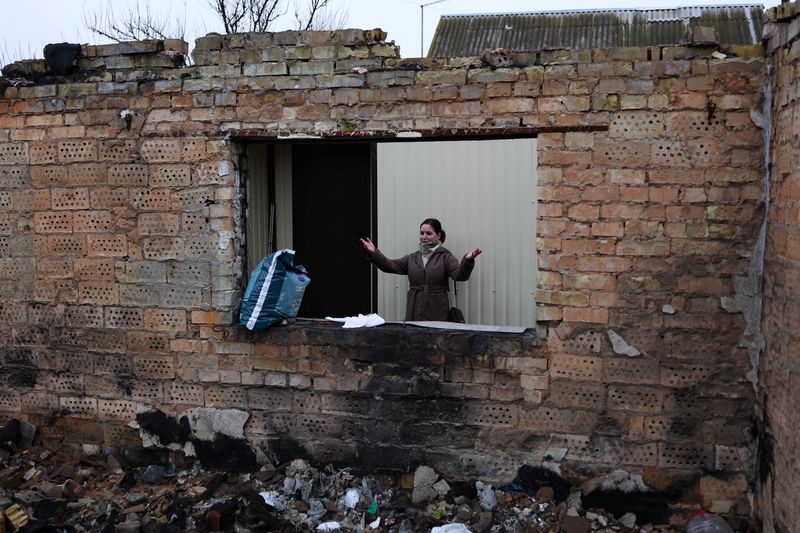By Felix Hoske and Anna Voitenko
MOSHCHUN, Ukraine (Reuters) - In a village devastated by Russia's abortive assault on nearby Kyiv in March, Kateryna Tyshchenko lives in a cramped temporary housing container next to the ruins of her fiancé's family home that was destroyed by an artillery shell.
Tyshchenko, 18, shares the container with her in-laws, fiancé and her nine-year-old half-sister. Regular power outages caused by Russian strikes on Ukraine's vital infrastructure mean they can only heat their tiny makeshift home sporadically.
Next week, night-time temperatures are forecast to drop below zero in the village of Moshchun, where some residents complain they have to forage for firewood in a forest that contains landmines in order to heat their homes.
Tyshchenko, who does not own a wood-burning heater, says she has no idea what lies ahead but she has no plans to abandon her home and village this winter even if things get much worse.
"Even if we don't have power for good, we'll endure it and survive. We just don't want to be shelled - everything else we can endure. The most important thing is that the (Russians) don't return. Apart from that, everything is fine," she said.
With the war in its ninth month, Russia is pounding energy infrastructure with drones and missiles, leaving millions of Ukrainians without power and even access to running water in a country where winter temperatures regularly hit -15 Celsius.
Moscow said last month it had launched strikes against energy, military and communications infrastructure as retaliation for what it called a "terrorist" attack on Russia's bridge to the annexed Ukrainian peninsula of Crimea.
Ukraine says the Russians are the "terrorists" and that it is fighting a defensive war for its survival.
Despite the hardships, many ordinary Ukrainians are enduring and adapting, and there is little sign for now of civilians turning on their leaders or pressuring them to negotiate a swift end to the conflict.
EMERGENCY BLACKOUTS
Moshchun, which is surrounded by pine forests and had a pre-war population of 800, was never fully occupied, but it was the site of fierce fighting before Russian troops withdrew in late March. Some 650-700 residents are still living in Moshchun, the local mayor said.
Tyshchenko fled Moshchun on March 4 and returned in April to find her home destroyed. Her own parents now live with friends while she moved into the housing container put up by volunteer activists in September.
Moshchun, located a few miles (km) north of the capital Kyiv, has been particularly badly affected by the Russian air strikes on nationwide infrastructure that began on Oct. 10.
Authorities say 40% of Ukraine's energy infrastructure has been seriously damaged, forcing them to introduce rolling blackouts. At such times Tyshchenko's household cannot use their sole electric heater and mobile phone signals cut out.
"I hope some volunteers will bring us a firewood boiler before winter starts," said Tyshchenko, who has been unemployed since the invasion. She has put off wedding plans until she and her fiance have a proper home.
"We didn't have power at all for a month and a half (when we returned to Moshchun). We lived here without crying and complaining."
A travelling dentist service operating out of the back of an ambulance visited the village this week, using a generator given to them by residents to power their tools because there was no electricity.
"Yesterday, the pain in my tooth got much worse. I was thinking of taking medicine, but I didn't know which pills to take," said Antonina Telychko, a 70-year-old resident who had a bad tooth removed in the ambulance.
"I thought I wouldn't endure until the next day."
PUBLIC RESOLVE
The public's resilience may prove a vital factor in the war, as Russia tries to break Ukrainian morale and Ukraine's President Volodymyr Zelenskiy insists that peace talks can only resume once Moscow gives back all the land it has occupied.
Anton Gushetsky, deputy director of the Kyiv International Institute of Sociology, said polling data showed 86% of Ukrainians still supported the idea of continued resistance against Russia.
The poll was conducted almost two weeks after Russia began its infrastructure attacks and there is no evidence, for now, of any impact on Ukrainian resolve to battle Russia, he said.
"The winter months could affect the situation and perhaps slightly more people could support negotiations... But we do not (currently) see a tendency to make concessions with Russia," he said.

Tyshchenko is determined to stay put.
"My soul belongs here, it's my yard, and living here means I can work in my garden and yard," she said. "But when you stay with your friends, you can't work in the yard because it's not yours."